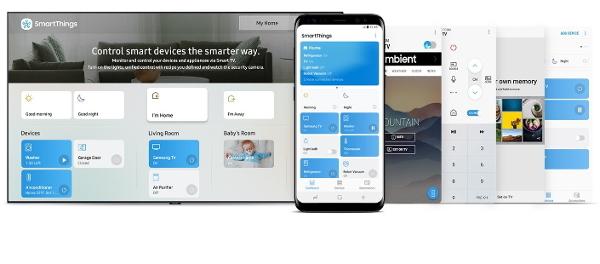There’s a fatal flaw in the logic that because 70% of Samsung TVs sold are Smart TVs, people want smart TVs. I have a smart TV. It’s a Panasonic VT60 Plasma. I also have an Apple TV 4K, which I use for all my streaming. My only interest in the VT60 was it’s quality as a display. I would have rather it had no smart features and be a little cheaper. Everyone who wants a superior display is stuck with the smart features, whether they want then or not. Samsung’s best displays are it’s QLEDs which are universally smart TVs. Whether their users want a smart TV or are just looking for a superior display.
Samsung Doubles Down on Artificial Intelligence

The company has said it plans to build AI features and Internet connectivity into all of its products by 2020 and to help make good on that promise recently announced plans to open AI research centers in the U.K., Canada, and Russia. The centers join AI-focused facilities opened in Seoul, Korea last fall and in Silicon Valley early this year.
The overarching mission in the words of Hyun-suk Kim, the head of Samsung Research, is to be a “game changer for the AI industry” as the company expands the number of AI researchers to around 1,000 over the next couple years.
“This new Center signifies our commitment to the advancement of AI,” said Andrew Blake, who will lead the U.K. facility in Cambridge. “Our research will help us to better understand human behavior while exploring areas like emotion recognition, and further expand the boundaries of user-centric communication to develop AI technologies that ultimately improve people’s lives.”
In describing the core principles behind its AI research, Samsung says the artificial intelligence it is developing will be…
• User-centric, “realizing personalization through a multi-modal interface”
• Always learning, through “continuous self-learning from data”
• Always there as an “ambient service”
• Always helpful, with “minimization of user intervention and response to requests”
• Always safe, “ensuring user safety and privacy”
“In the coming years, Internet of Things (IoT) devices embedded with AI will generate a vast array of data that can provide fascinating insights about the lives of users, enabling them to take advantage of intelligent services optimized for their own personal preferences and behaviors,” Samsung said, noting that how AI-enabled devices provide consumers with the optimized options will be critical to the success of AI technology in the near future.
To provide a user-centric ecosystem, Samsung said it aims to build an AI platform under a common architecture that will scale quickly and “provide the deepest understanding of usage context and behaviors, making AI more relevant and useful.”
Noting that more than 70 percent of the TVs Samsung sold globally last year were “smart TVs,” Samsung points to a growing demand for smart TV functionality that is easy and convenient, which is why its 2018 QLED TVs use AI to simplify the process of setting up the TV and connecting it with other devices.
When the TV is set up the first time, it automatically connects to the user’s Samsung smartphone, or any mobile device with Samsung’s SmartThings app installed, and takes you to set-up. Network information on the smartphone is shared, instantly connecting the TV to the same Wi-Fi network, and if the user’s mobile device is linked to a Samsung Account, that information will also be shared with the TV.
The QLED TVs are also equipped with “one remote control” functionality, enabling content searches and navigation to be conducted using voice commands via Samsung’s Bixby platform.
“This year’s smart features of QLED TV have made it easier for users to enjoy the TV experience more conveniently,” said Heeman Lee, vice president of Samsung’s Visual Display Business. “We will realize home IoT that changes the lifestyle by various connected devices communicating organically.”
- Log in or register to post comments


Seems like we're getting a whole bunch of devices arguing about "who da streamer?" My TV, BlueRay player, Roku, cable box, and media server ALL can provide that. I don't WANT all in one devices, because technology changes unevenly, and the producer of a purpose-built streaming device is going to pay more attention to its quality than the product manager of a TV with bunches of other features to worry about. Pain in the butt to go in to all of them and shut streaming down, while still maintaining the ability to do wireless firmware updates.

























































